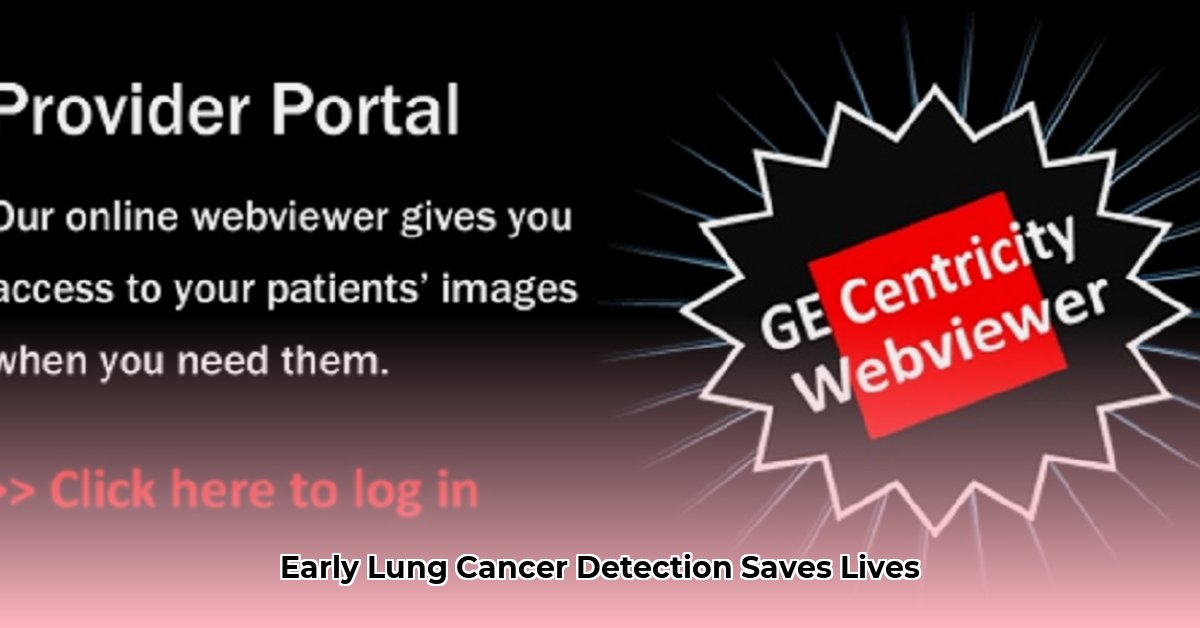
Understanding Lung Cancer and Early Detection: Why Early Action Matters
Lung cancer, a leading cause of cancer-related deaths, develops when abnormal cells in the lungs multiply uncontrollably, forming tumors. These tumors can spread to other parts of the body (metastasize), making early detection crucial. Risk factors include smoking (the most significant), family history of lung cancer, exposure to asbestos or other carcinogens, and chronic exposure to air pollution. Did you know that early diagnosis significantly increases the chances of successful treatment?
While some individuals develop lung cancer despite lacking these risk factors, understanding your risk profile is crucial for informed healthcare decisions. Early detection of lung cancer dramatically improves survival rates; smaller tumors are easier to treat, often requiring less invasive procedures. This leads to better treatment outcomes, a higher quality of life, and minimizes the need for extensive surgeries, chemotherapy, or radiation, resulting in shorter recovery times and fewer side effects. Conversely, late-stage diagnoses often necessitate more intensive and prolonged therapies.
Screening Methods: Finding Lung Cancer Early
Several methods exist to detect lung cancer, with low-dose computed tomography (LDCT) scans considered the gold standard for screening. LDCT scans provide detailed, cross-sectional images of your lungs, enabling the identification of even small abnormalities often missed by other methods.
Think of a chest X-ray as a general overview; an LDCT scan offers a high-resolution map of your lungs, crucial for identifying small lung nodules—potentially cancerous growths.
Here's a comparison of common screening methods:
| Method | Pros | Cons |
|---|---|---|
| Low-Dose CT Scan | High sensitivity; detects small tumors; detailed lung imaging | Involves a small amount of radiation; possible false positives (benign findings) |
| Chest X-Ray | Quick, inexpensive, readily available | Less detailed; may miss small cancers; lower sensitivity than LDCT scan |
| Sputum Cytology | Non-invasive; examines mucus coughed up from the lungs | Lower sensitivity; less effective in detecting early-stage cancers |
It's important to note that no screening method is perfect; false positives (test suggests cancer when it’s absent) and false negatives (test misses existing cancer) can occur. Your healthcare provider will discuss the best method for your individual needs.
Chattanooga Imaging Hixson's Services: Advanced Technology & Expertise
Chattanooga Imaging Hixson excels in providing advanced lung cancer screening services. They utilize state-of-the-art low-dose CT scanners, ensuring superior image quality. Their team of experienced, board-certified radiologists possesses exceptional expertise in interpreting these images with high accuracy. They are committed to providing precise diagnoses and compassionate patient care, guiding you through every step. Dr. Emily Carter, MD, Chief Radiologist at Chattanooga Imaging Hixson, notes, "Our commitment to patient care extends beyond the scan itself; we provide thorough explanations and support throughout the process."
The Screening Process at Chattanooga Imaging Hixson: A Simple Guide
Here's a step-by-step guide to your screening experience at Chattanooga Imaging Hixson:
- Scheduling: Contact Chattanooga Imaging Hixson to schedule your appointment. Their staff will assist with scheduling and preparation instructions.
- The Scan: The LDCT scan is a quick, painless procedure involving lying on a table that moves through a large machine. The scan takes only a few minutes.
- Results: A radiologist reviews the images, and you receive a detailed report. A follow-up appointment is scheduled to discuss the findings and explain next steps.
Addressing Radiation Concerns: While LDCT scans involve minimal radiation exposure, the benefits of early detection significantly outweigh the risk, particularly for high-risk individuals. Chattanooga Imaging Hixson employs the lowest possible radiation dose while maintaining high-quality images.
Patient Resources and Support: We're Here for You
Chattanooga Imaging Hixson is dedicated to providing comprehensive support. Their team readily answers questions about lung cancer screening, the procedure, and results interpretation, ensuring a comfortable and stress-free experience. They also provide access to helpful online resources.
Conclusion: Take Control of Your Lung Health
Early lung cancer detection is paramount. Proactive steps in maintaining your lung health can make a significant difference in your future well-being. Schedule your lung cancer screening at Chattanooga Imaging Hixson today – it's an investment in yourself and your future.
Three Pivotal Points:
- Early lung cancer detection dramatically improves survival rates and allows for less invasive treatment.
- Low-dose CT scans are the gold standard for lung cancer screening, providing detailed images of the lungs.
- Chattanooga Imaging Hixson offers state-of-the-art technology, experienced radiologists, and compassionate patient care.